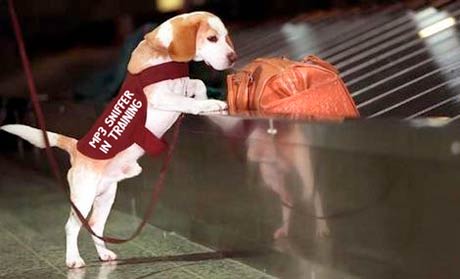Advocates of information security are soon to be resigning everywhere. According to a number of sources, the Canadian federal government has undergone a series of covert negotiations that aim to unite a number countries under the banner of anti copyright-infringement. This deal is known as the Anti-Counterfeiting Trade Agreement (ACTA), and speculations concerning ACTA have gained momentum with the apparent leaking of a four-page document outlining the agreement.
Joining the U.S. in negotiations as well as members of the European Union and Australia, the deal would allow any digital media storage devices to fall under the scrutiny of the likes of police officers, border guards, and other public security personnel. This means that if a border guard thinks that your 64kbps Much Dance 98 CD's physical parent never graced your CD drive, they have the right to issue you a fine, confiscate, or even destroy the offending hardware. This includes iPods, laptops, hard drives and even cellphones. Whether or not your data was obtained legally is up to the discretion of the condemning authority figure. Were this agreement to gain legs, it would walk over and hammer a nail in the coffins of both digital freedom rights and privacy rights in one fell swoop. And before you cry sensationalism, know that federal trade agreements such as this don't require parliamentary approval, and this plan is going before the G8 summit in July of this year.
Provisions of the agreement involve border and airport searches of hardware for ripped music and movies (MP3 sniffer dogs are on the agenda for '09). Internet service providers would also be required to submit client information concerning suspected copyright infringers to authorities without any required warrant. ACTA is alleged to be proposed as an organisation independent of other trade or copyright enforcement agencies, including the Recording Industry Association of America (RIAA) or the World Trade Organization (WTO), which means you have another division of the man to look out for.
MP3 sniffer dogs in training
Joining the U.S. in negotiations as well as members of the European Union and Australia, the deal would allow any digital media storage devices to fall under the scrutiny of the likes of police officers, border guards, and other public security personnel. This means that if a border guard thinks that your 64kbps Much Dance 98 CD's physical parent never graced your CD drive, they have the right to issue you a fine, confiscate, or even destroy the offending hardware. This includes iPods, laptops, hard drives and even cellphones. Whether or not your data was obtained legally is up to the discretion of the condemning authority figure. Were this agreement to gain legs, it would walk over and hammer a nail in the coffins of both digital freedom rights and privacy rights in one fell swoop. And before you cry sensationalism, know that federal trade agreements such as this don't require parliamentary approval, and this plan is going before the G8 summit in July of this year.
Provisions of the agreement involve border and airport searches of hardware for ripped music and movies (MP3 sniffer dogs are on the agenda for '09). Internet service providers would also be required to submit client information concerning suspected copyright infringers to authorities without any required warrant. ACTA is alleged to be proposed as an organisation independent of other trade or copyright enforcement agencies, including the Recording Industry Association of America (RIAA) or the World Trade Organization (WTO), which means you have another division of the man to look out for.
MP3 sniffer dogs in training
